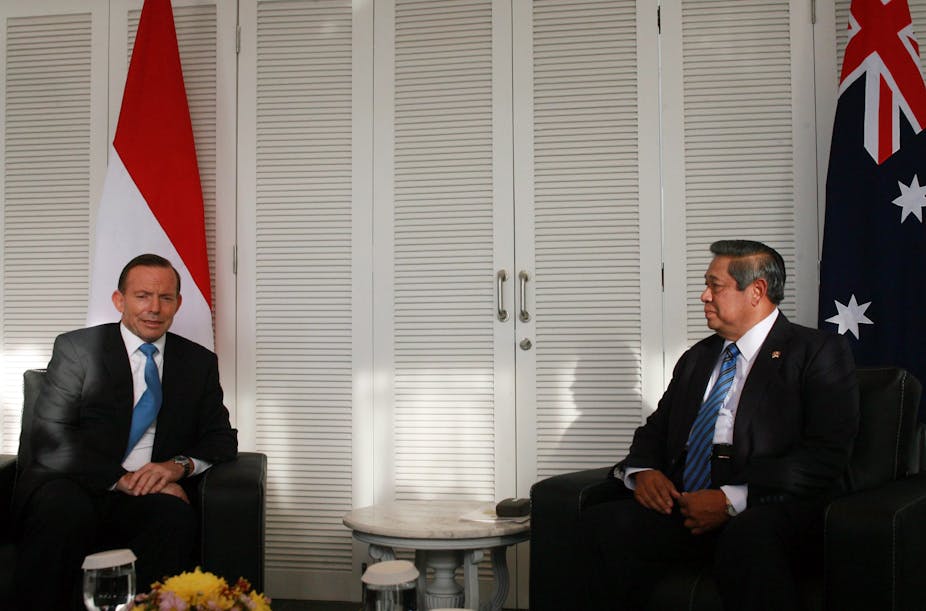It’s not a good sign when parties cannot even agree on what they have just put their signatures to. On Thursday, Australian foreign minister Julie Bishop and her Indonesian counterpart Marty Natalegawa met in Bali to sign a Joint Understanding of a Code of Conduct – or a Code of Conduct on Framework for Security Cooperation, as Indonesian president Susilo Bambang Yudhoyono’s website titles it.
But whatever you call it, this document is expected to put the Australia-Indonesia diplomatic and security relationship back on track.
It may well do that. The relationship has been improving steadily over the past few months, and especially after the meeting Australian prime minister Tony Abbott had with SBY in Batam in June.
But without decrying the significance of this development, the real issue is actually not what SBY has just done, but rather what will be done by the incoming president, Joko Widodo – commonly referred to as Jokowi.
SBY leaves office with his reputation as a political leader badly damaged in the eyes of many Indonesians. It is ironic that of all the political challenges his administration faced during his second term of office, it was the tapping of his mobile phone and that of his wife to which he reacted most forcefully.
SBY did little, many Indonesian observers have pointedly noted, to curb religiously inspired violence – for instance against members of the Ahmadiyah and Shia minorities. But when his wife’s phone was tapped, he went for the political jugular.
Jokowi will be a different kind of president. He will be more inward-looking than SBY, more concerned with domestic issues than foreign ones. He said last month:
Our focus will be on domestic affairs first. We’ve got a lot of domestic problems.
Unlike SBY – and his opponent in the election, Prabowo Subianto – Jokowi comes to office with little international experience. He knows Singapore quite well, having often visited there during his business career, and seems to be more comfortable with English than many have assumed. But that seems to be about the extent of his international exposure.
Jokowi’s views on Australia are not publicly known with any great certainty. We can get some sense of what he thinks, though, by looking at what he said during the third presidential candidates’ debate on June 22. The debate focused on foreign and defence policy.
Jokowi asked Prabowo what was wrong with the Indonesia-Australia relationship, which made it rise and fall so routinely. Nothing really, replied Prabowo, except perhaps that Australians had suspicions, possibly even a phobia, about Indonesia. His solution? Indonesia needed to show Australians that it wants to be good neighbours – but also to show that it is a strong nation, not to be meddled with.
Jokowi agreed that there were no major problems in the relationship that an improvement in trust would not fix – Australia’s trust of Indonesia, of course. But he went on to develop a more nuanced response than Prabowo’s.
The absence of trust, Jokowi argued, could be overcome through what he described as three-pronged diplomacy: G2G (Government to Government), B2B (Business to Business) and P2P (People to People). He stressed in particular the importance of cultural and educational diplomacy. That should go down well in Bishop’s eyes, as she most clearly identified with the New Colombo Plan.
But underlying it all was Jokowi’s reiteration that Australia had to be careful not to belittle Indonesia, or underplay its significance.
Given his general focus on domestic politics, Jokowi’s choice of foreign minister will be crucially important in shaping Indonesia’s foreign policy. His foreign policy adviser during the campaign was Rizal Sukma, a senior researcher at a Jakarta-based think tank, the Centre for Strategic and International Studies, and a frequent visitor to Australia.

Rizal probably won’t be chosen as foreign minister. The general practice in Indonesia has been to appoint a senior diplomat. But Rizal is likely to remain an influential voice in the new administration.
One former senior diplomat whose name has come up as a potential foreign minister is Dino Patti Djalal, a former ambassador to the United States and adviser to SBY. Unfortunately for Australia, his mobile phone was one of those it was tapping in 2009. If he does become foreign minister, Australia had better hope he has a forgiving nature.
Another possibility is that Natalegawa will retain the job. How strong his case is is hard to tell. He has performed his tasks reasonably enough, but domestic observers often compare him unfavourably with his predecessor, Hassan Wirayuda.
The other factor in shaping Indonesian foreign policy will be its parliament. On paper, the coalition backing Jokowi holds only a minority of parliamentary seats. However, Indonesian political coalitions are fragile and generally focused only on a single issue, so Jokowi’s position is not as grim as the statistics might suggest.
Nonetheless, party leaders in the parliament are likely to find rather more domestically important subjects than Australia on which to berate the new president.
Overall, the Joint Understanding – or the Code of Conduct – may be important in symbolising the resumption of the full suite of relations between Canberra and Jakarta. It is good to have the spying issue behind us. But many other issues will play a more important role in defining the bilateral relationship under Jokowi. The agreement belongs to SBY’s old administration – not to Jokowi’s incoming one.

